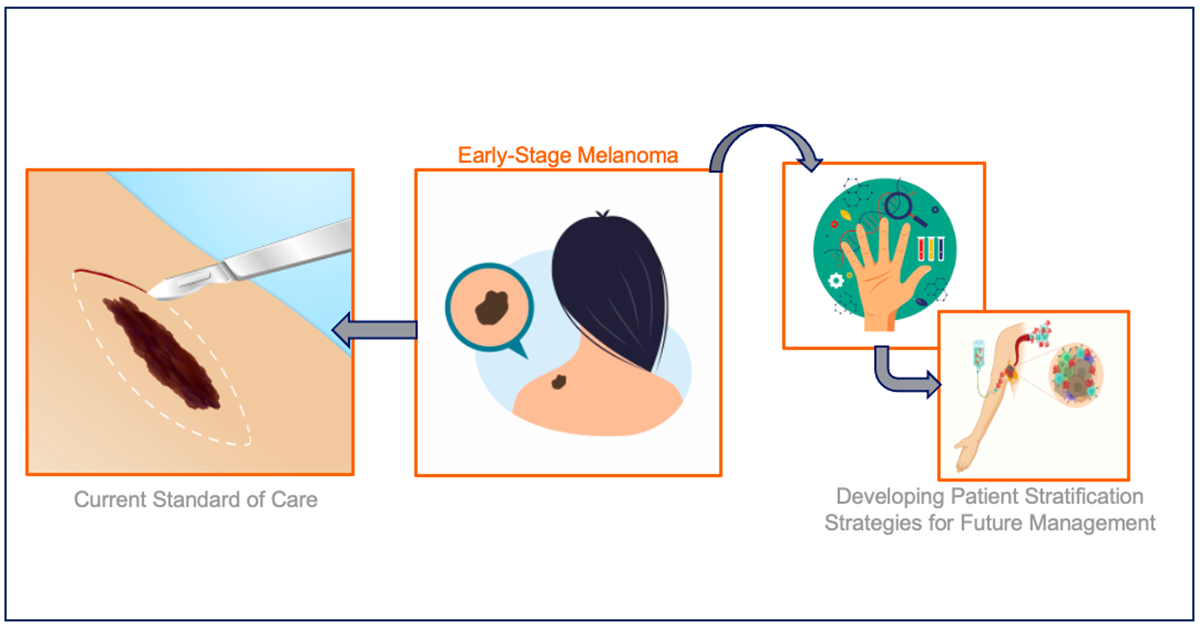Treatment Strategies and Emerging Biomarkers in High-Risk Early-Stage Melanoma
A special issue of Cancers (ISSN 2072-6694). This special issue belongs to the section "Cancer Therapy".
Deadline for manuscript submissions: closed (20 January 2024) | Viewed by 387

Special Issue Editors
Interests: melanoma; immunotherapy; biomarkers; digital pathology
Interests: melanoma; immunotherapy; cutaneous T cell lymphoma (CTCL); dermatology; biomarkers
Special Issues, Collections and Topics in MDPI journals
Special Issue Information
Dear Colleagues,
Melanoma remains an aggressive disease. Although patients with melanoma are most frequently diagnosed with early-stage disease, they are at high risk for recurrence and subsequent death even after surgical resection, the current standard of care. Immunotherapy for stage IIIC-D melanoma has been well defined, but its role in stage II-IIIB disease remains controversial despite growing evidence supporting adjuvant and neoadjuvant therapy in this population. Furthermore, studies have also depicted the advent of potential biomarkers that may serve to stratify these early-stage melanoma patients for clinical trials of adjuvant and/or neoadjuvant therapy, in addition to providing prognostic information. While neo-adjuvant therapy has proven to be beneficial in stage III disease, sequencing surgery and immunotherapy can be challenging in early-stage melanoma, especially when tumors are small. Thus, increased awareness and research efforts for the management of these early-stage melanoma patients are urgently needed.
For this Special Issue of Cancers, titled “Treatment Strategies and Emerging Biomarkers in High-Risk Early-Stage Melanoma”, we are pleased to invite you to contribute original research articles or reviews regarding the molecular landscape of stage II–III melanoma and potential targets for treatment. We also welcome research, including basic, translational, and clinical studies, on novel approaches for the characterization and management of this subset of melanoma patients. Submissions may also recount the history of early-stage melanoma and the evolution of clinical data specific to this group.
This Special Issue aims to provide insight on the prognostic and clinical limitations that exist with traditional histopathologic and staging methods for early-stage melanoma patients and call for approaches that may lead to better patient outcomes.
We look forward to receiving your contributions.
Dr. Yvonne M. Saenger
Prof. Dr. Larisa J. Geskin
Guest Editors
Manuscript Submission Information
Manuscripts should be submitted online at www.mdpi.com by registering and logging in to this website. Once you are registered, click here to go to the submission form. Manuscripts can be submitted until the deadline. All submissions that pass pre-check are peer-reviewed. Accepted papers will be published continuously in the journal (as soon as accepted) and will be listed together on the special issue website. Research articles, review articles as well as communications are invited. For planned papers, a title and short abstract (about 100 words) can be sent to the Editorial Office for announcement on this website.
Submitted manuscripts should not have been published previously, nor be under consideration for publication elsewhere (except conference proceedings papers). All manuscripts are thoroughly refereed through a single-blind peer-review process. A guide for authors and other relevant information for submission of manuscripts is available on the Instructions for Authors page. Cancers is an international peer-reviewed open access semimonthly journal published by MDPI.
Please visit the Instructions for Authors page before submitting a manuscript. The Article Processing Charge (APC) for publication in this open access journal is 2900 CHF (Swiss Francs). Submitted papers should be well formatted and use good English. Authors may use MDPI's English editing service prior to publication or during author revisions.
Keywords
- early-stage melanoma
- biomarkers
- immunotherapy
- molecular landscape
- potential targets for treatment
Benefits of Publishing in a Special Issue
- Ease of navigation: Grouping papers by topic helps scholars navigate broad scope journals more efficiently.
- Greater discoverability: Special Issues support the reach and impact of scientific research. Articles in Special Issues are more discoverable and cited more frequently.
- Expansion of research network: Special Issues facilitate connections among authors, fostering scientific collaborations.
- External promotion: Articles in Special Issues are often promoted through the journal's social media, increasing their visibility.
- e-Book format: Special Issues with more than 10 articles can be published as dedicated e-books, ensuring wide and rapid dissemination.
Further information on MDPI's Special Issue polices can be found here.







